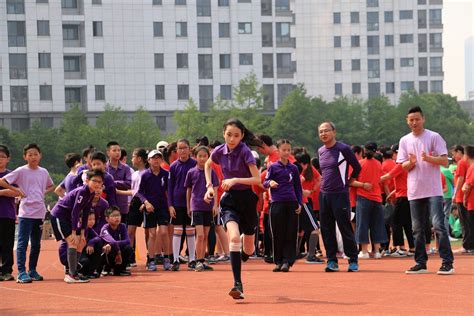Integrating sports activities into school programs provides a dynamic platform for English language learners to develop both their physical and language skills. By leveraging the communicative and collaborative nature of sports, educators can create immersive learning experiences that enhance students' language proficiency, cultural understanding, and overall wellbeing. By implementing practical strategies and fostering a supportive learning environment, schools can harness the power of sports to enrich students' language learning journey.
2.
Incorporate Language Drills
: Integrate language learning exercises into sports drills and warmup activities. For example, students can practice spelling sportsrelated words while jogging around the field or engage in roleplays simulating game scenarios to improve speaking skills.
3.
Cultural Understanding
: Many sports have cultural significance and traditions associated with them. By participating in sports, students not only learn the rules of the game but also gain insights into the cultural contexts in which these sports originated. This cultural awareness fosters appreciation and understanding of diverse perspectives, contributing to their overall language and cultural competence.
3.
Postgame Reflections
: After each game or practice session, facilitate group discussions where students reflect on their performance, discuss strategies, and share their experiences in English. Encourage students to provide constructive feedback to their peers, fostering communication and critical thinking skills.
4.
Crosscurricular Connections
: Explore interdisciplinary connections by integrating sports themes into other subject areas, such as writing essays about famous athletes in English class or conducting scientific experiments related to sports physiology in science class. This approach reinforces language learning while promoting a holistic understanding of sports.
1.
Enhanced Communication Skills
: Engaging in team sports requires effective communication among players to coordinate movements and strategies. English language learners can improve their speaking and listening skills by communicating with teammates, coaches, and opponents during practices and games. Encouraging students to express themselves on the field helps build confidence in using English in reallife situations.
Conclusion
Benefits of School Sports Activities for English Language Learners
Practical Strategies for Maximizing Language Learning in School Sports Activities
2.
Vocabulary Acquisition
: Sports activities introduce students to a wide range of vocabulary related to the game, equipment, rules, and techniques. Through active participation and discussions, students learn and reinforce sportsrelated terminology, which expands their English vocabulary repertoire. Teachers can incorporate vocabularybuilding exercises into sports sessions to reinforce learning.
Introduction
Title: Engaging in School Sports Activities: Enhancing Physical Education and Language Skills

1.
Pregame Vocabulary Preparation
: Before each sports session, introduce key vocabulary related to the game, such as names of equipment, game actions, and common phrases used during play. Provide visual aids, flashcards, or handouts to reinforce vocabulary acquisition.
4.
Teamwork and Collaboration
: Sports promote teamwork, cooperation, and collaboration, essential skills in both sports and language learning. Working towards a common goal with teammates requires effective communication, problemsolving, and mutual support. These collaborative experiences transfer to the language learning process, where students engage in group activities, discussions, and projects.
Participation in sports activities within school settings not only fosters physical wellbeing but also offers invaluable opportunities for language development, particularly in English. Integrating sports into the curriculum can enhance students' language skills through various means, including communication during games, discussing strategies, and learning sportsrelated vocabulary. This article explores the benefits of incorporating sports activities into school programs for English language learners and provides practical suggestions for educators to maximize language learning through sports.
5.
Physical and Mental Health Benefits
: In addition to language development, school sports activities contribute to students' physical and mental wellbeing. Regular exercise improves concentration, reduces stress, and boosts overall mood, creating a conducive environment for language learning. Healthy students are more likely to be engaged and motivated learners in the classroom.
5.
Celebrate Diversity
: Embrace the cultural diversity within sports by exploring games and traditions from various countries and regions. Organize multicultural sports events or themed days where students can learn about different cultures through sports, promoting inclusivity and appreciation for diversity.

